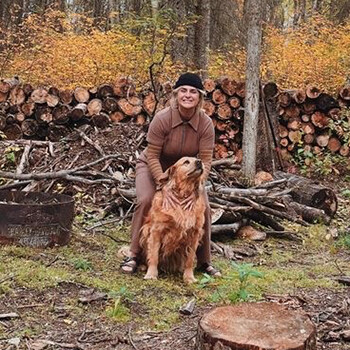Meet a Board Member: Megan Edgar

Get to know the people behind the Beaver Hills Biosphere.
One of the Biosphere’s newest board members, Megan Edgar joined the board earlier this year. Megan spent her childhood in the Beaver Hills and continues to live, work, volunteer and play here. Over this time, she’s seen more people enjoying all the Biosphere has to offer, from birding to cross-country skiing – and she couldn’t be more thrilled about it. The Biosphere is evolving, and she’s honoured to help shape its future.
“I love this place,” says Megan. “I couldn’t pass up the opportunity to help shape and promote the Biosphere.”
Since she was in elementary school, Megan has been a naturalist and an outspoken defender of nature. From identifying the birds in her own backyard in the Biosphere as a child, starting her high school’s Environmental Club as a teenager and studying environmental science in university, Megan has a lifelong passion for the environment.
Now she works as a wildlife biologist with Canadian Wildlife Service, focusing on boreal birds in the north and the prairies.
Megan’s education in environmental science and conservation biology, along with her work and volunteer experience in wildlife research, science communication and even weed pulling have all informed her passion for the BHB and its conservation.
“These experiences have reinforced my desire to contribute to the protection of the Beaver Hills Biosphere – I want to put my education and work experience to work and give back to the place that helped foster that love for nature,” Megan says.
When she’s not working or serving on the board, Megan loves to get outdoors and enjoy the Beaver Hills through biking, running, birding and looking for cool plants. Defending this landscape is important to her both as a resident, and as a biologist interested in conservation.
“I hope to leverage my local knowledge and experiences to help safeguard this unique region and inspire others to do the same,” Megan says.
She’s proud to be offering her skills, knowledge and passion to the Biopshere – especially in the face of our changing climate.
“The natural world as we know it is changing,” Megan says. “I think that the Biosphere is a good example of how nature and humans can co-exist in a healthy way. This place and this organization really set an example of what balance and harmony between humans and wildlife can be.”
Megan is excited to join the team and offer her passion and scientific expertise to the vital work of the Beaver Hills Biosphere.
Learn more about the Biosphere board.
Hi Megan "I love this place" so resonated with me! My family and I have lived in Collingwood Cove on the north shore of Cooking Lake for nearly twenty-eight years. I'm an artist - photographer/painter and I have been drawn to the lake and it's natural beauty and bird habitat. It is stopping place to thousands of migratory birds and home to deer and moose which haven't been around as much these past years. And maybe because of the sunshine this shore gets, its full of wonderful weeds and plants that are moving into the areas that have dried up. There are alot of us that have properties or businesses on or because of the lake. So, I'm connecting with you for several reasons: I have some questions about the lake and why it's drying up when most of the lakes around us are still full of water? The answer I've gotten when I've checked into this with the county is just that it's shallow and because of drought has been evaporating. Where did it used to get it's water from? Has any of it's source been cut off? I wanted you to know, in case someone studying the area needs it, that we've had a neighbour who has documented the birds and their timing and movements from the 60's when he first arrived in the Cove to the early 90's and we have all of his notes on that. Many of our neighbours also have bison (or buffalo) skeletons or bones that were found on the lake as it dried up several years ago. We have a few too. I'm having a show of my paintings of the area around the lake, Islet Lake and the Beaver Hills Biodiversity Trail next winter (2025) but I've also been documenting the lake and it's changes with my camera. My studio is here and I'm open to having visitors. If any of this would be helpful in maintaining, sustaining, promoting or researching this area, I'd be happy to share what I have. All that to say I'm excited that this area is part of the Beaver Hill Biosphere and sad about the lake disappearing. If you've never been for a walk on the trails along this side of Cooking Lake it would be another interesting area to take in. I love this special place. Thanks for your time and consideration, Wanda
Wanda Benterud
PostedHi Wanda, we appreciate you taking the time to read our stories and provide your feedback. In response to your comments/questions: • We invite you or anyone else with a business situated within the Beaver Hills Biosphere to create a free listing on our online Tourism Directory. • Regarding Cooking Lake, we invite you to connect with the recently formed Friends of Cooking Lake stewardship group. • The Biosphere will soon be launching our Surface Water Community of Practice to explore some of the questions you have posed regarding water levels and links to past and future scenarios. • The Biosphere is also working on climate change modelling, which also connects to the soon to be formed Surface Water Community of Practice.
Comments